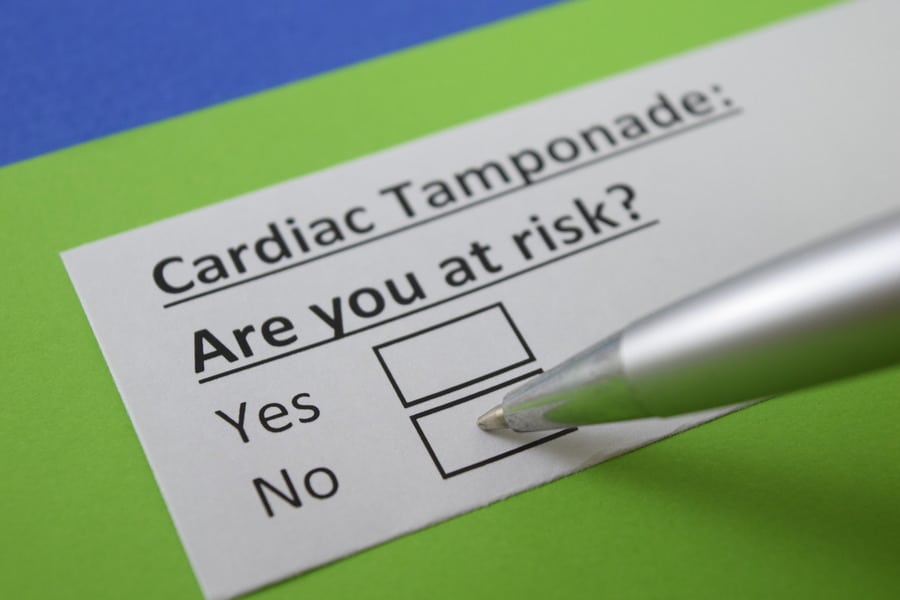Cardiac tamponade is a medical emergency that occurs when fluid accumulates in the pericardium, the thin sac surrounding the heart. This accumulation of fluid can compress the heart, preventing it from functioning properly and leading to a rapid drop in blood pressure. If left untreated, cardiac tamponade can be fatal. Therefore, prompt recognition and treatment of this condition are essential.
Definition and Overview:
The pericardium is a double-layered sac that envelops the heart. It contains a small amount of fluid, called pericardial fluid, that serves as a lubricant, reducing friction between the layers as the heart beats. However, when excess fluid accumulates in the pericardium, it can cause the sac to exert pressure on the heart, restricting its ability to pump blood effectively. This condition is known as cardiac tamponade.
Symptoms:
The symptoms of cardiac tamponade can vary depending on the rate of fluid accumulation and the underlying cause. Acute tamponade, caused by a sudden buildup of fluid, can lead to severe symptoms, while chronic tamponade, characterized by slow fluid accumulation, may have more subtle symptoms. Common symptoms of cardiac tamponade include:
- Shortness of breath
- Chest pain or discomfort
- Fatigue or weakness
- Rapid heartbeat
- Swelling of the legs and abdomen
- Low blood pressure
Causes:
Cardiac tamponade can result from a variety of causes, including:
- Trauma: Blunt or penetrating injuries to the chest can cause fluid to accumulate in the pericardium.
- Pericarditis: Inflammation of the pericardium can cause fluid buildup.
- Heart surgery: Complications from heart surgery may lead to tamponade.
- Cancer: Tumors near the heart can cause fluid accumulation.
- Autoimmune diseases: Conditions like lupus or rheumatoid arthritis can lead to pericarditis and tamponade.
- Infections: Infections such as tuberculosis can cause pericardial effusion and tamponade.
Risk Factors:
Risk factors for cardiac tamponade include a history of pericarditis, recent heart surgery, chest trauma, cancer, autoimmune diseases, and infections that can affect the pericardium.
Avoidance and Prevention:
Preventing cardiac tamponade involves managing the underlying conditions that can lead to fluid accumulation in the pericardium. This may include:
- Prompt treatment of pericarditis
- Careful management of autoimmune diseases
- Early detection and treatment of infections
- Monitoring for complications after heart surgery
When to See a Doctor:
If you experience symptoms such as sudden shortness of breath, chest pain, or severe fatigue, seek medical attention immediately. Cardiac tamponade is a life-threatening condition that requires prompt diagnosis and treatment.
Diagnosis and Treatment:
Cardiac tamponade is typically diagnosed through physical examination, ECG, echocardiogram, and other imaging studies. Treatment usually involves removing the excess fluid from the pericardium, a procedure known as pericardiocentesis. In some cases, surgery may be needed to create a permanent opening in the pericardium to prevent fluid accumulation.
Helpful Information:
One of the hallmarks of cardiac tamponade is a triad of clinical signs known as “Beck’s Triad.” This triad includes:
- Hypotension: Low blood pressure occurs because the heart is unable to pump blood effectively due to the compression from the accumulated fluid in the pericardium. V
- Muffled heart sounds: The buildup of fluid dampens the sound of the heartbeats, making them difficult to hear with a stethoscope.
- Jugular venous distention: The veins in the neck may become visibly enlarged due to increased pressure in the venous system as the heart struggles to pump blood effectively.
In conclusion, Cardiac tamponade is a serious condition that can be life-threatening if not promptly treated. It occurs when excess fluid accumulates in the pericardium, compressing the heart and impairing its function. Understanding the symptoms, causes, and risk factors of cardiac tamponade is crucial for timely diagnosis and intervention. Proper management of underlying conditions can help prevent this dangerous condition. If you experience symptoms of cardiac tamponade, seek medical attention immediately.









